Crisis in International Trade: The WTO, Cooperation, and Challenges
VerifiedAdded on 2023/06/10
|14
|3603
|391
Report
AI Summary
This report provides a comprehensive analysis of the crisis currently facing the World Trade Organization (WTO). It begins with an overview of the WTO's functions, principles, and its role in facilitating international trade. The report then delves into the critical issues challenging the WTO, including the non-cooperation of the United States, particularly regarding the Appellate Body. It examines the causes of this crisis, such as trade disputes between the USA and China, and the increasing trend of free trade agreements and regional economic cooperation. The report explores the economic interpretations and implications of economic cooperation, detailing the rationale behind such agreements and their impact on the WTO's activities. It highlights how these agreements reduce the central importance of the WTO and diminish its role in regulating international trade. The document emphasizes the challenges faced by the WTO in addressing global concerns like food security and climate change. Overall, the report provides a detailed understanding of the current state of the WTO and the factors shaping its future in the global economic landscape.
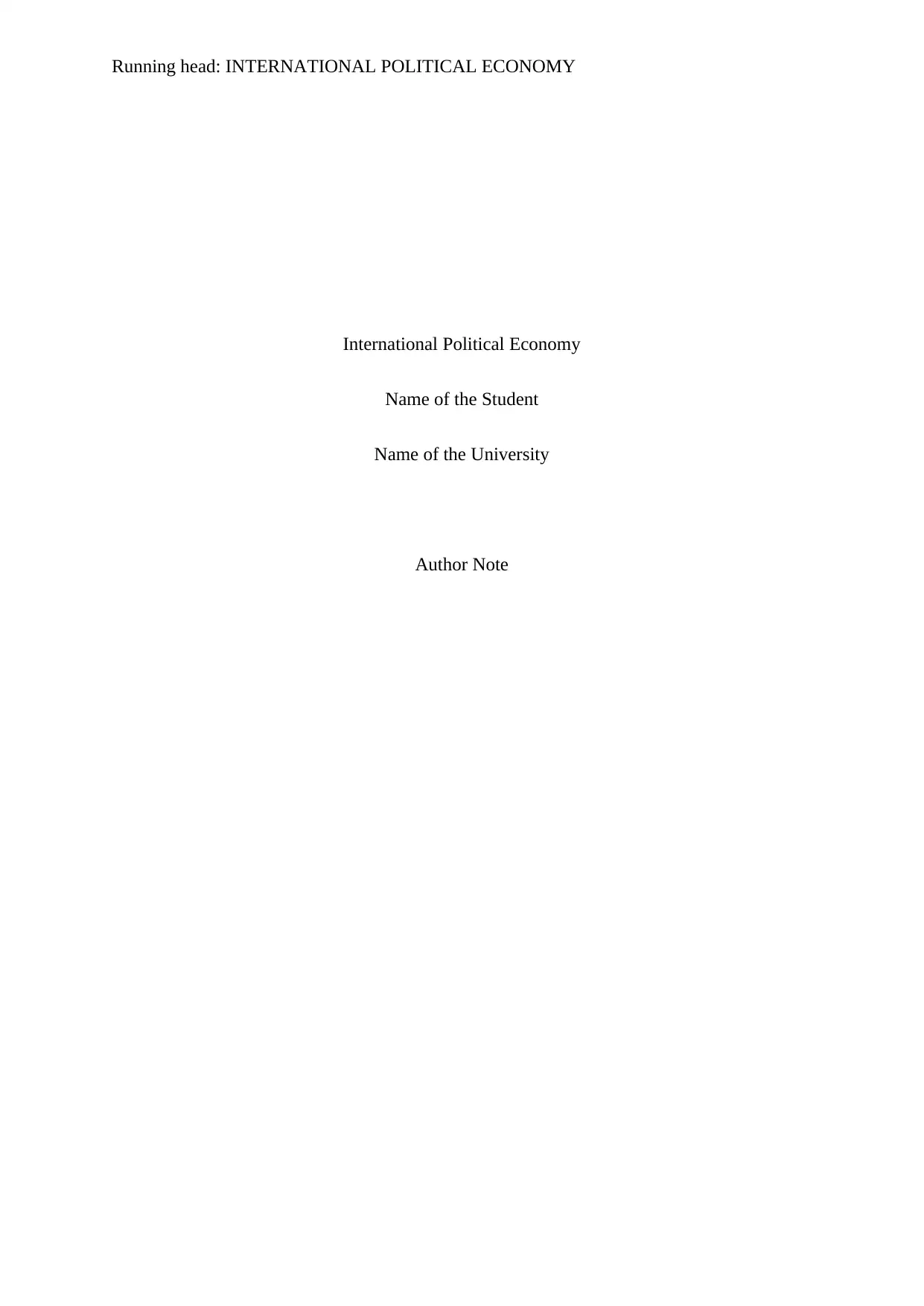
Running head: INTERNATIONAL POLITICAL ECONOMY
International Political Economy
Name of the Student
Name of the University
Author Note
International Political Economy
Name of the Student
Name of the University
Author Note
Paraphrase This Document
Need a fresh take? Get an instant paraphrase of this document with our AI Paraphraser
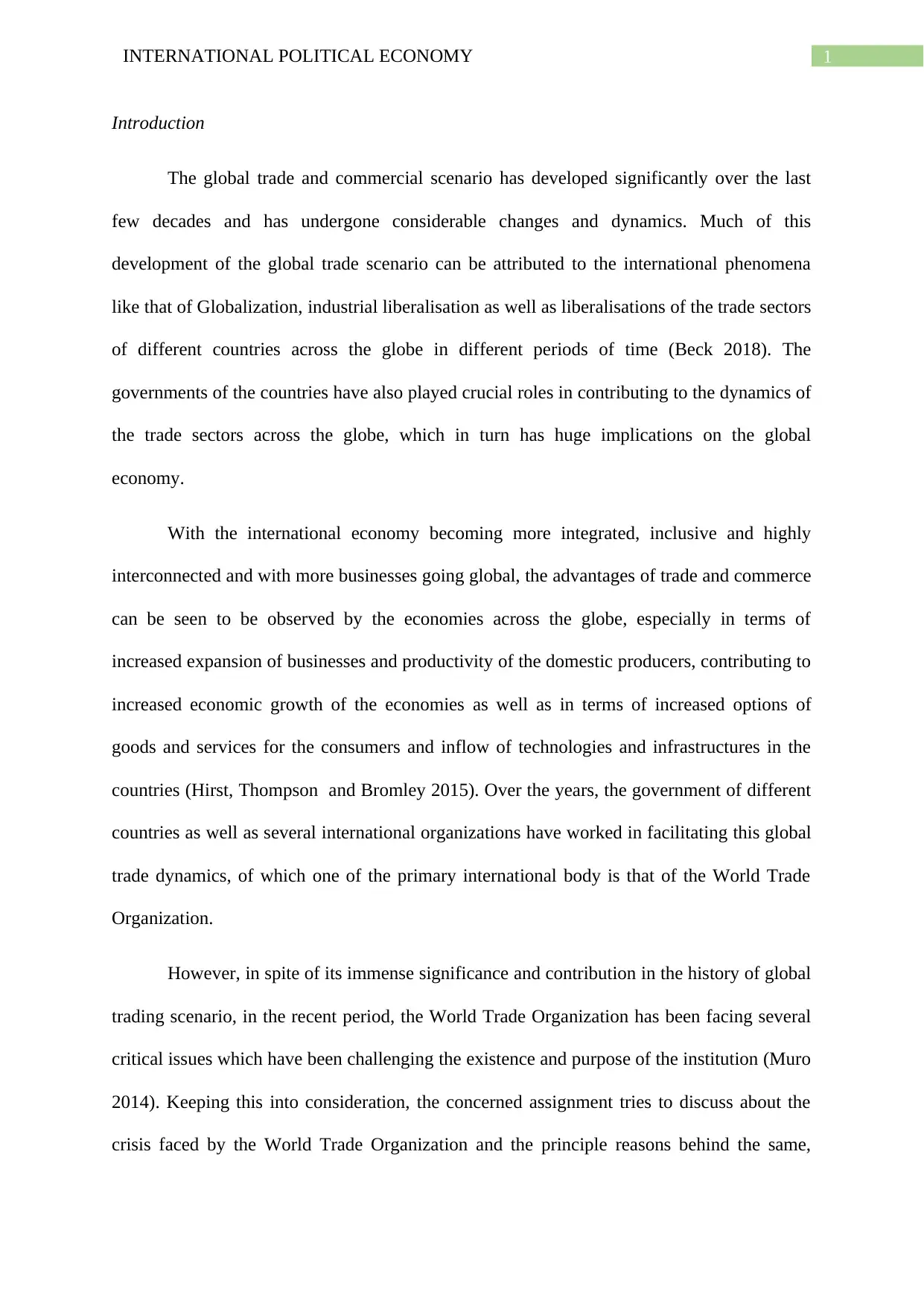
1INTERNATIONAL POLITICAL ECONOMY
Introduction
The global trade and commercial scenario has developed significantly over the last
few decades and has undergone considerable changes and dynamics. Much of this
development of the global trade scenario can be attributed to the international phenomena
like that of Globalization, industrial liberalisation as well as liberalisations of the trade sectors
of different countries across the globe in different periods of time (Beck 2018). The
governments of the countries have also played crucial roles in contributing to the dynamics of
the trade sectors across the globe, which in turn has huge implications on the global
economy.
With the international economy becoming more integrated, inclusive and highly
interconnected and with more businesses going global, the advantages of trade and commerce
can be seen to be observed by the economies across the globe, especially in terms of
increased expansion of businesses and productivity of the domestic producers, contributing to
increased economic growth of the economies as well as in terms of increased options of
goods and services for the consumers and inflow of technologies and infrastructures in the
countries (Hirst, Thompson and Bromley 2015). Over the years, the government of different
countries as well as several international organizations have worked in facilitating this global
trade dynamics, of which one of the primary international body is that of the World Trade
Organization.
However, in spite of its immense significance and contribution in the history of global
trading scenario, in the recent period, the World Trade Organization has been facing several
critical issues which have been challenging the existence and purpose of the institution (Muro
2014). Keeping this into consideration, the concerned assignment tries to discuss about the
crisis faced by the World Trade Organization and the principle reasons behind the same,
Introduction
The global trade and commercial scenario has developed significantly over the last
few decades and has undergone considerable changes and dynamics. Much of this
development of the global trade scenario can be attributed to the international phenomena
like that of Globalization, industrial liberalisation as well as liberalisations of the trade sectors
of different countries across the globe in different periods of time (Beck 2018). The
governments of the countries have also played crucial roles in contributing to the dynamics of
the trade sectors across the globe, which in turn has huge implications on the global
economy.
With the international economy becoming more integrated, inclusive and highly
interconnected and with more businesses going global, the advantages of trade and commerce
can be seen to be observed by the economies across the globe, especially in terms of
increased expansion of businesses and productivity of the domestic producers, contributing to
increased economic growth of the economies as well as in terms of increased options of
goods and services for the consumers and inflow of technologies and infrastructures in the
countries (Hirst, Thompson and Bromley 2015). Over the years, the government of different
countries as well as several international organizations have worked in facilitating this global
trade dynamics, of which one of the primary international body is that of the World Trade
Organization.
However, in spite of its immense significance and contribution in the history of global
trading scenario, in the recent period, the World Trade Organization has been facing several
critical issues which have been challenging the existence and purpose of the institution (Muro
2014). Keeping this into consideration, the concerned assignment tries to discuss about the
crisis faced by the World Trade Organization and the principle reasons behind the same,
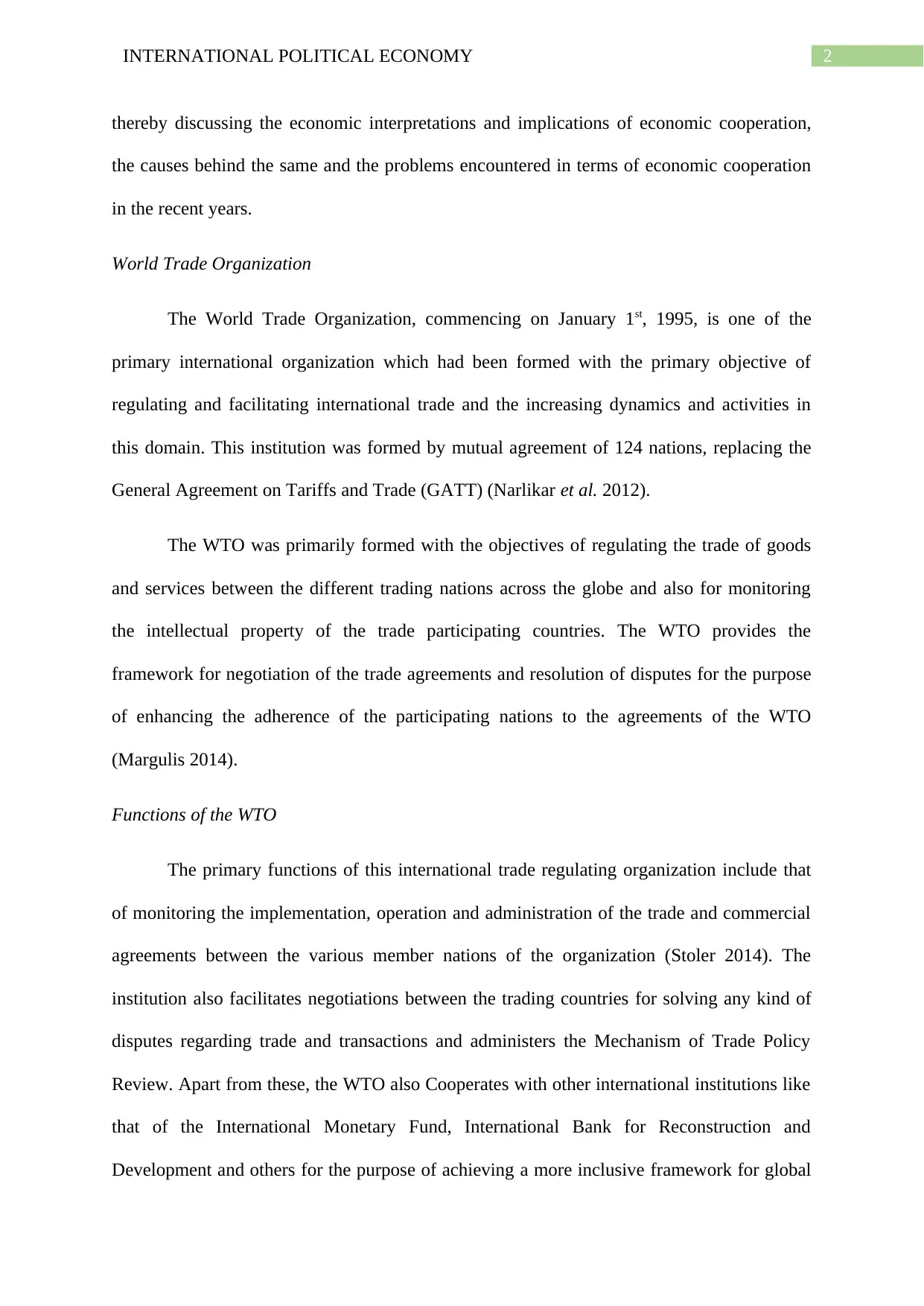
2INTERNATIONAL POLITICAL ECONOMY
thereby discussing the economic interpretations and implications of economic cooperation,
the causes behind the same and the problems encountered in terms of economic cooperation
in the recent years.
World Trade Organization
The World Trade Organization, commencing on January 1st, 1995, is one of the
primary international organization which had been formed with the primary objective of
regulating and facilitating international trade and the increasing dynamics and activities in
this domain. This institution was formed by mutual agreement of 124 nations, replacing the
General Agreement on Tariffs and Trade (GATT) (Narlikar et al. 2012).
The WTO was primarily formed with the objectives of regulating the trade of goods
and services between the different trading nations across the globe and also for monitoring
the intellectual property of the trade participating countries. The WTO provides the
framework for negotiation of the trade agreements and resolution of disputes for the purpose
of enhancing the adherence of the participating nations to the agreements of the WTO
(Margulis 2014).
Functions of the WTO
The primary functions of this international trade regulating organization include that
of monitoring the implementation, operation and administration of the trade and commercial
agreements between the various member nations of the organization (Stoler 2014). The
institution also facilitates negotiations between the trading countries for solving any kind of
disputes regarding trade and transactions and administers the Mechanism of Trade Policy
Review. Apart from these, the WTO also Cooperates with other international institutions like
that of the International Monetary Fund, International Bank for Reconstruction and
Development and others for the purpose of achieving a more inclusive framework for global
thereby discussing the economic interpretations and implications of economic cooperation,
the causes behind the same and the problems encountered in terms of economic cooperation
in the recent years.
World Trade Organization
The World Trade Organization, commencing on January 1st, 1995, is one of the
primary international organization which had been formed with the primary objective of
regulating and facilitating international trade and the increasing dynamics and activities in
this domain. This institution was formed by mutual agreement of 124 nations, replacing the
General Agreement on Tariffs and Trade (GATT) (Narlikar et al. 2012).
The WTO was primarily formed with the objectives of regulating the trade of goods
and services between the different trading nations across the globe and also for monitoring
the intellectual property of the trade participating countries. The WTO provides the
framework for negotiation of the trade agreements and resolution of disputes for the purpose
of enhancing the adherence of the participating nations to the agreements of the WTO
(Margulis 2014).
Functions of the WTO
The primary functions of this international trade regulating organization include that
of monitoring the implementation, operation and administration of the trade and commercial
agreements between the various member nations of the organization (Stoler 2014). The
institution also facilitates negotiations between the trading countries for solving any kind of
disputes regarding trade and transactions and administers the Mechanism of Trade Policy
Review. Apart from these, the WTO also Cooperates with other international institutions like
that of the International Monetary Fund, International Bank for Reconstruction and
Development and others for the purpose of achieving a more inclusive framework for global
⊘ This is a preview!⊘
Do you want full access?
Subscribe today to unlock all pages.

Trusted by 1+ million students worldwide
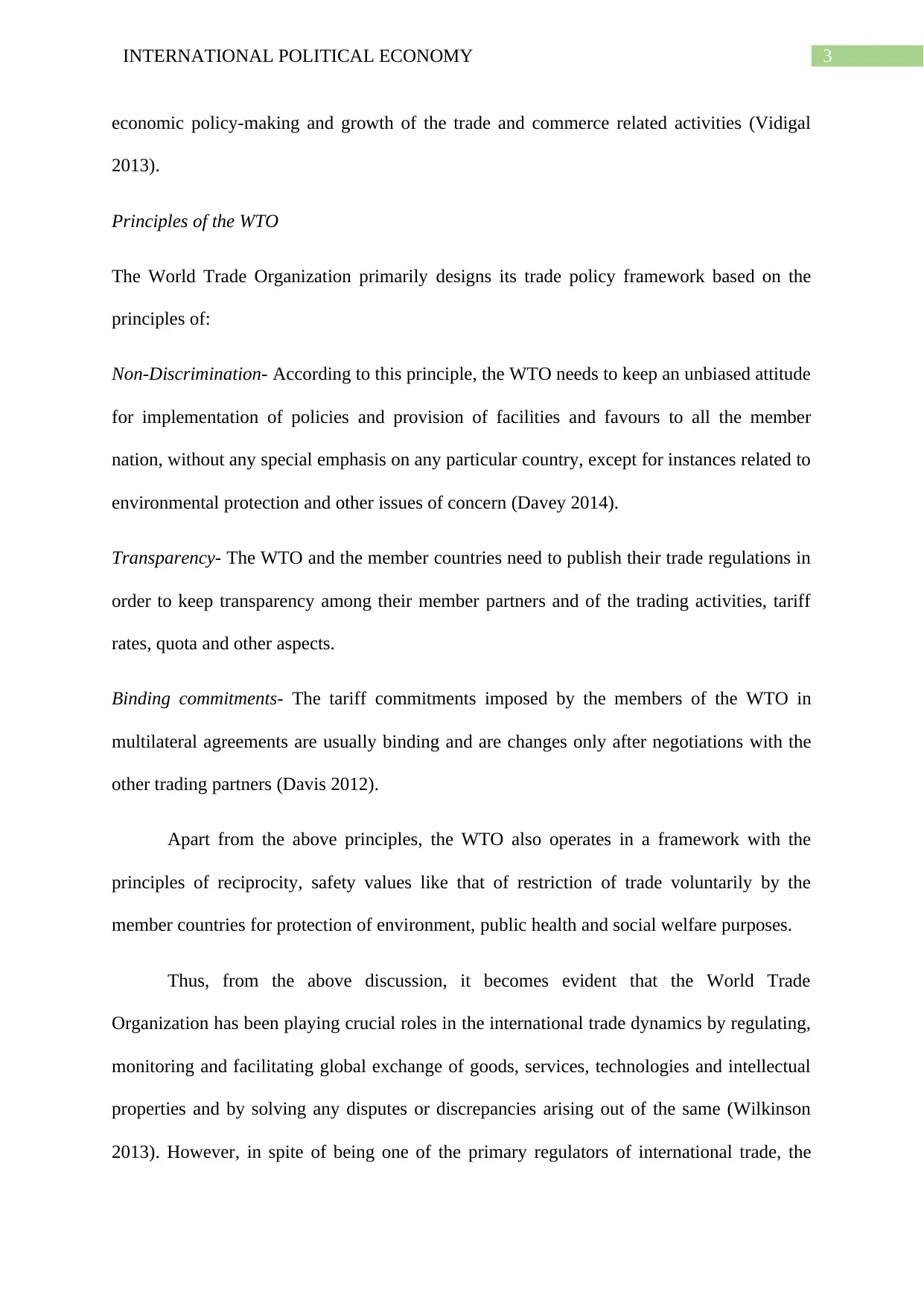
3INTERNATIONAL POLITICAL ECONOMY
economic policy-making and growth of the trade and commerce related activities (Vidigal
2013).
Principles of the WTO
The World Trade Organization primarily designs its trade policy framework based on the
principles of:
Non-Discrimination- According to this principle, the WTO needs to keep an unbiased attitude
for implementation of policies and provision of facilities and favours to all the member
nation, without any special emphasis on any particular country, except for instances related to
environmental protection and other issues of concern (Davey 2014).
Transparency- The WTO and the member countries need to publish their trade regulations in
order to keep transparency among their member partners and of the trading activities, tariff
rates, quota and other aspects.
Binding commitments- The tariff commitments imposed by the members of the WTO in
multilateral agreements are usually binding and are changes only after negotiations with the
other trading partners (Davis 2012).
Apart from the above principles, the WTO also operates in a framework with the
principles of reciprocity, safety values like that of restriction of trade voluntarily by the
member countries for protection of environment, public health and social welfare purposes.
Thus, from the above discussion, it becomes evident that the World Trade
Organization has been playing crucial roles in the international trade dynamics by regulating,
monitoring and facilitating global exchange of goods, services, technologies and intellectual
properties and by solving any disputes or discrepancies arising out of the same (Wilkinson
2013). However, in spite of being one of the primary regulators of international trade, the
economic policy-making and growth of the trade and commerce related activities (Vidigal
2013).
Principles of the WTO
The World Trade Organization primarily designs its trade policy framework based on the
principles of:
Non-Discrimination- According to this principle, the WTO needs to keep an unbiased attitude
for implementation of policies and provision of facilities and favours to all the member
nation, without any special emphasis on any particular country, except for instances related to
environmental protection and other issues of concern (Davey 2014).
Transparency- The WTO and the member countries need to publish their trade regulations in
order to keep transparency among their member partners and of the trading activities, tariff
rates, quota and other aspects.
Binding commitments- The tariff commitments imposed by the members of the WTO in
multilateral agreements are usually binding and are changes only after negotiations with the
other trading partners (Davis 2012).
Apart from the above principles, the WTO also operates in a framework with the
principles of reciprocity, safety values like that of restriction of trade voluntarily by the
member countries for protection of environment, public health and social welfare purposes.
Thus, from the above discussion, it becomes evident that the World Trade
Organization has been playing crucial roles in the international trade dynamics by regulating,
monitoring and facilitating global exchange of goods, services, technologies and intellectual
properties and by solving any disputes or discrepancies arising out of the same (Wilkinson
2013). However, in spite of being one of the primary regulators of international trade, the
Paraphrase This Document
Need a fresh take? Get an instant paraphrase of this document with our AI Paraphraser
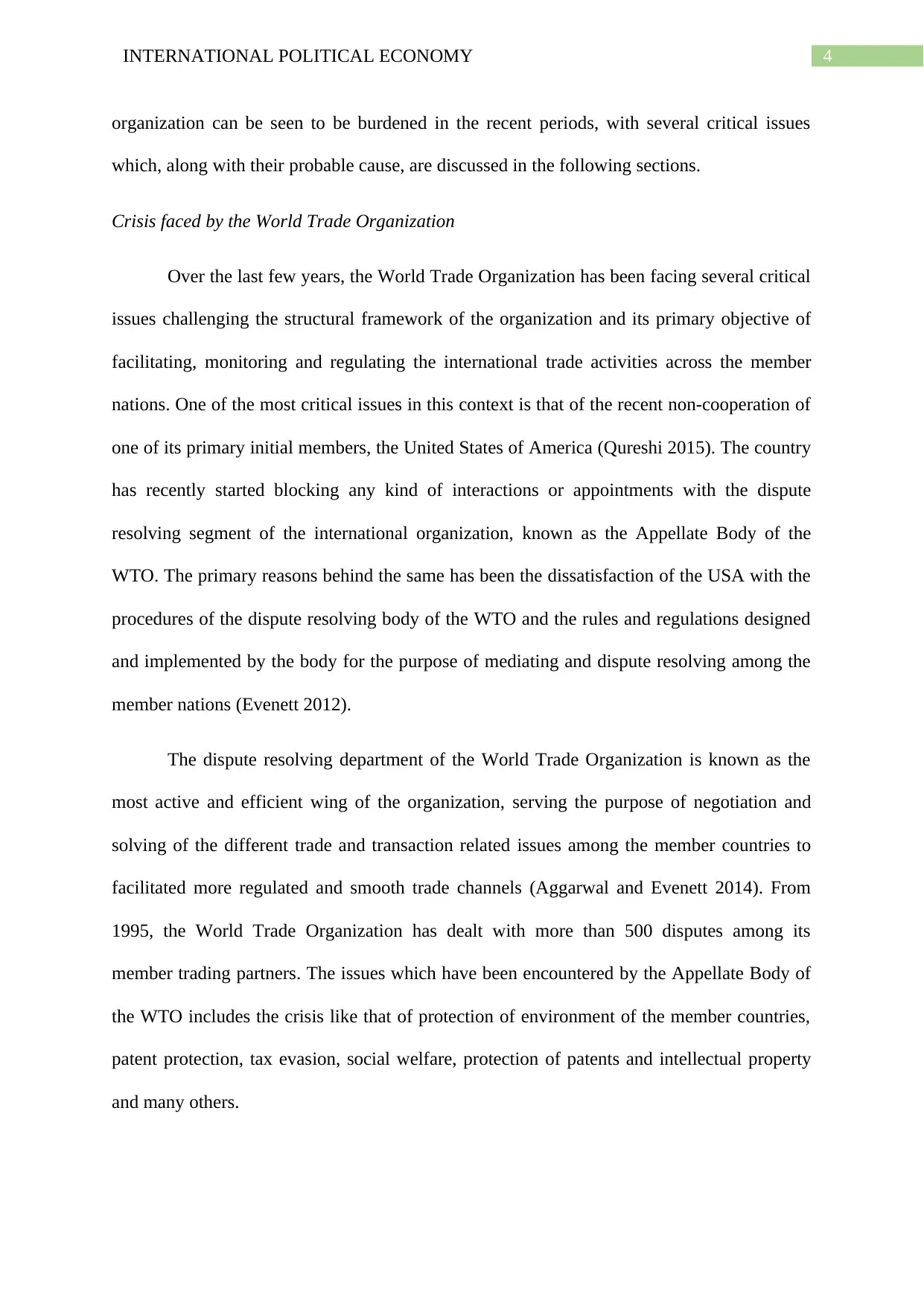
4INTERNATIONAL POLITICAL ECONOMY
organization can be seen to be burdened in the recent periods, with several critical issues
which, along with their probable cause, are discussed in the following sections.
Crisis faced by the World Trade Organization
Over the last few years, the World Trade Organization has been facing several critical
issues challenging the structural framework of the organization and its primary objective of
facilitating, monitoring and regulating the international trade activities across the member
nations. One of the most critical issues in this context is that of the recent non-cooperation of
one of its primary initial members, the United States of America (Qureshi 2015). The country
has recently started blocking any kind of interactions or appointments with the dispute
resolving segment of the international organization, known as the Appellate Body of the
WTO. The primary reasons behind the same has been the dissatisfaction of the USA with the
procedures of the dispute resolving body of the WTO and the rules and regulations designed
and implemented by the body for the purpose of mediating and dispute resolving among the
member nations (Evenett 2012).
The dispute resolving department of the World Trade Organization is known as the
most active and efficient wing of the organization, serving the purpose of negotiation and
solving of the different trade and transaction related issues among the member countries to
facilitated more regulated and smooth trade channels (Aggarwal and Evenett 2014). From
1995, the World Trade Organization has dealt with more than 500 disputes among its
member trading partners. The issues which have been encountered by the Appellate Body of
the WTO includes the crisis like that of protection of environment of the member countries,
patent protection, tax evasion, social welfare, protection of patents and intellectual property
and many others.
organization can be seen to be burdened in the recent periods, with several critical issues
which, along with their probable cause, are discussed in the following sections.
Crisis faced by the World Trade Organization
Over the last few years, the World Trade Organization has been facing several critical
issues challenging the structural framework of the organization and its primary objective of
facilitating, monitoring and regulating the international trade activities across the member
nations. One of the most critical issues in this context is that of the recent non-cooperation of
one of its primary initial members, the United States of America (Qureshi 2015). The country
has recently started blocking any kind of interactions or appointments with the dispute
resolving segment of the international organization, known as the Appellate Body of the
WTO. The primary reasons behind the same has been the dissatisfaction of the USA with the
procedures of the dispute resolving body of the WTO and the rules and regulations designed
and implemented by the body for the purpose of mediating and dispute resolving among the
member nations (Evenett 2012).
The dispute resolving department of the World Trade Organization is known as the
most active and efficient wing of the organization, serving the purpose of negotiation and
solving of the different trade and transaction related issues among the member countries to
facilitated more regulated and smooth trade channels (Aggarwal and Evenett 2014). From
1995, the World Trade Organization has dealt with more than 500 disputes among its
member trading partners. The issues which have been encountered by the Appellate Body of
the WTO includes the crisis like that of protection of environment of the member countries,
patent protection, tax evasion, social welfare, protection of patents and intellectual property
and many others.
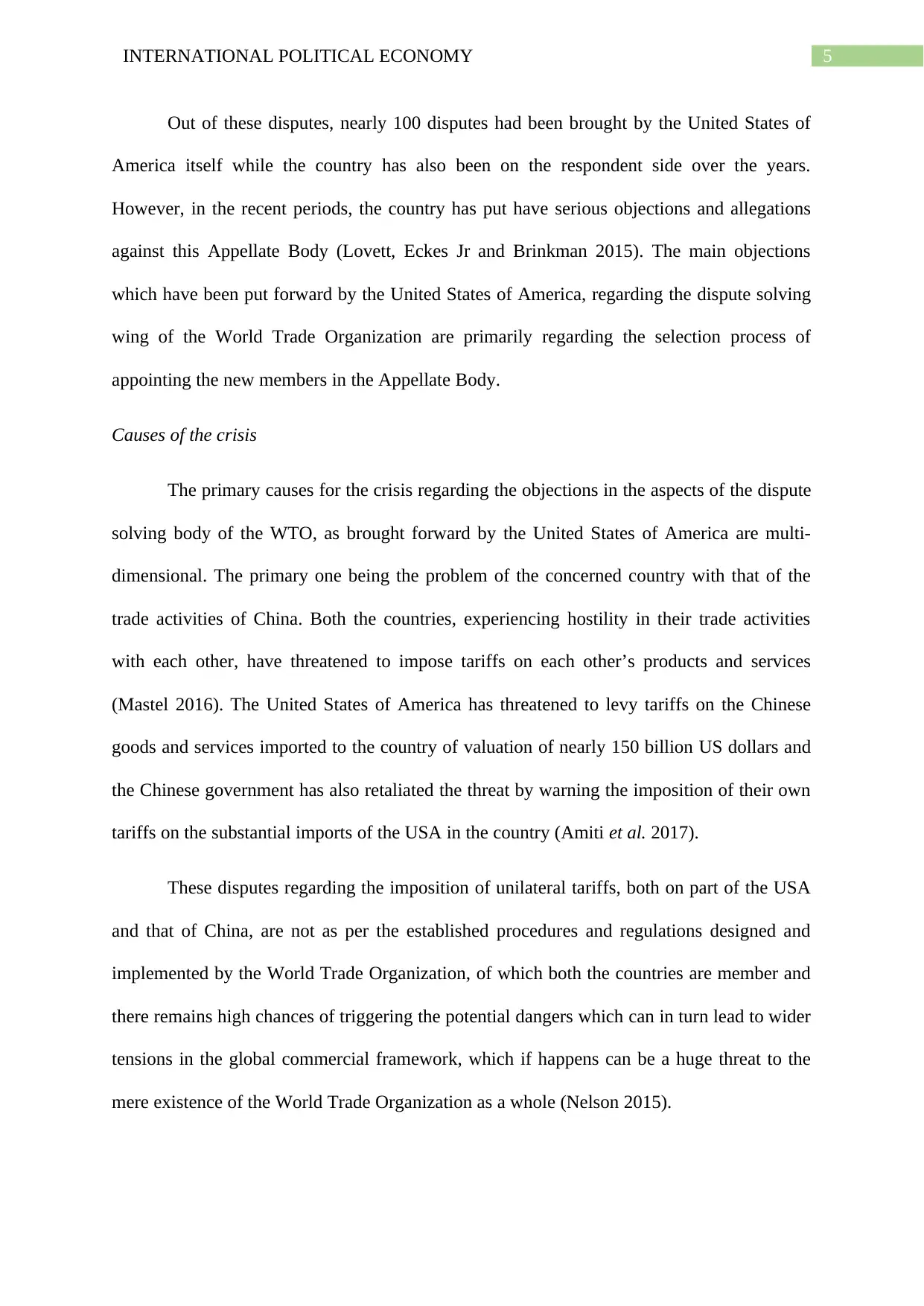
5INTERNATIONAL POLITICAL ECONOMY
Out of these disputes, nearly 100 disputes had been brought by the United States of
America itself while the country has also been on the respondent side over the years.
However, in the recent periods, the country has put have serious objections and allegations
against this Appellate Body (Lovett, Eckes Jr and Brinkman 2015). The main objections
which have been put forward by the United States of America, regarding the dispute solving
wing of the World Trade Organization are primarily regarding the selection process of
appointing the new members in the Appellate Body.
Causes of the crisis
The primary causes for the crisis regarding the objections in the aspects of the dispute
solving body of the WTO, as brought forward by the United States of America are multi-
dimensional. The primary one being the problem of the concerned country with that of the
trade activities of China. Both the countries, experiencing hostility in their trade activities
with each other, have threatened to impose tariffs on each other’s products and services
(Mastel 2016). The United States of America has threatened to levy tariffs on the Chinese
goods and services imported to the country of valuation of nearly 150 billion US dollars and
the Chinese government has also retaliated the threat by warning the imposition of their own
tariffs on the substantial imports of the USA in the country (Amiti et al. 2017).
These disputes regarding the imposition of unilateral tariffs, both on part of the USA
and that of China, are not as per the established procedures and regulations designed and
implemented by the World Trade Organization, of which both the countries are member and
there remains high chances of triggering the potential dangers which can in turn lead to wider
tensions in the global commercial framework, which if happens can be a huge threat to the
mere existence of the World Trade Organization as a whole (Nelson 2015).
Out of these disputes, nearly 100 disputes had been brought by the United States of
America itself while the country has also been on the respondent side over the years.
However, in the recent periods, the country has put have serious objections and allegations
against this Appellate Body (Lovett, Eckes Jr and Brinkman 2015). The main objections
which have been put forward by the United States of America, regarding the dispute solving
wing of the World Trade Organization are primarily regarding the selection process of
appointing the new members in the Appellate Body.
Causes of the crisis
The primary causes for the crisis regarding the objections in the aspects of the dispute
solving body of the WTO, as brought forward by the United States of America are multi-
dimensional. The primary one being the problem of the concerned country with that of the
trade activities of China. Both the countries, experiencing hostility in their trade activities
with each other, have threatened to impose tariffs on each other’s products and services
(Mastel 2016). The United States of America has threatened to levy tariffs on the Chinese
goods and services imported to the country of valuation of nearly 150 billion US dollars and
the Chinese government has also retaliated the threat by warning the imposition of their own
tariffs on the substantial imports of the USA in the country (Amiti et al. 2017).
These disputes regarding the imposition of unilateral tariffs, both on part of the USA
and that of China, are not as per the established procedures and regulations designed and
implemented by the World Trade Organization, of which both the countries are member and
there remains high chances of triggering the potential dangers which can in turn lead to wider
tensions in the global commercial framework, which if happens can be a huge threat to the
mere existence of the World Trade Organization as a whole (Nelson 2015).
⊘ This is a preview!⊘
Do you want full access?
Subscribe today to unlock all pages.

Trusted by 1+ million students worldwide
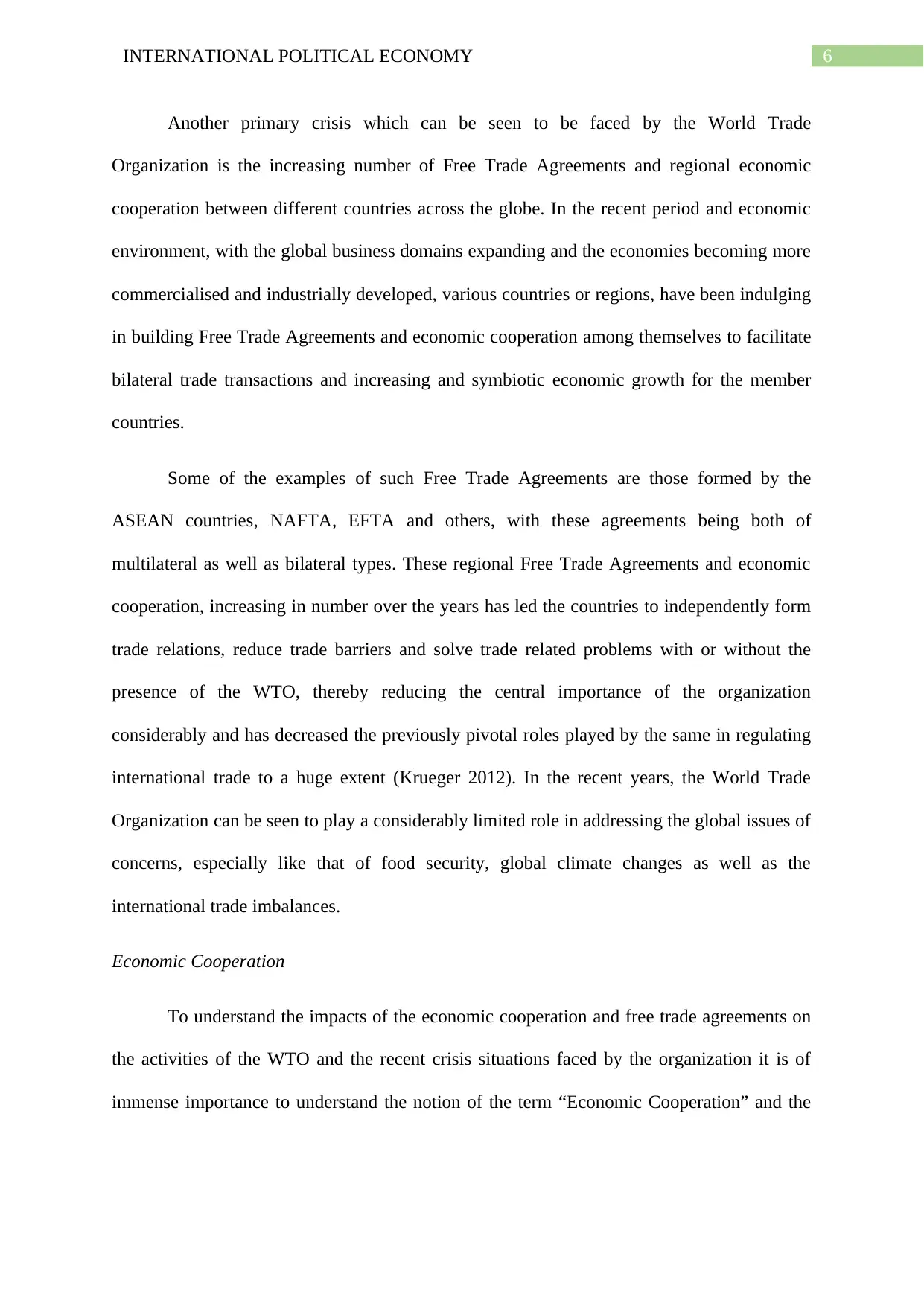
6INTERNATIONAL POLITICAL ECONOMY
Another primary crisis which can be seen to be faced by the World Trade
Organization is the increasing number of Free Trade Agreements and regional economic
cooperation between different countries across the globe. In the recent period and economic
environment, with the global business domains expanding and the economies becoming more
commercialised and industrially developed, various countries or regions, have been indulging
in building Free Trade Agreements and economic cooperation among themselves to facilitate
bilateral trade transactions and increasing and symbiotic economic growth for the member
countries.
Some of the examples of such Free Trade Agreements are those formed by the
ASEAN countries, NAFTA, EFTA and others, with these agreements being both of
multilateral as well as bilateral types. These regional Free Trade Agreements and economic
cooperation, increasing in number over the years has led the countries to independently form
trade relations, reduce trade barriers and solve trade related problems with or without the
presence of the WTO, thereby reducing the central importance of the organization
considerably and has decreased the previously pivotal roles played by the same in regulating
international trade to a huge extent (Krueger 2012). In the recent years, the World Trade
Organization can be seen to play a considerably limited role in addressing the global issues of
concerns, especially like that of food security, global climate changes as well as the
international trade imbalances.
Economic Cooperation
To understand the impacts of the economic cooperation and free trade agreements on
the activities of the WTO and the recent crisis situations faced by the organization it is of
immense importance to understand the notion of the term “Economic Cooperation” and the
Another primary crisis which can be seen to be faced by the World Trade
Organization is the increasing number of Free Trade Agreements and regional economic
cooperation between different countries across the globe. In the recent period and economic
environment, with the global business domains expanding and the economies becoming more
commercialised and industrially developed, various countries or regions, have been indulging
in building Free Trade Agreements and economic cooperation among themselves to facilitate
bilateral trade transactions and increasing and symbiotic economic growth for the member
countries.
Some of the examples of such Free Trade Agreements are those formed by the
ASEAN countries, NAFTA, EFTA and others, with these agreements being both of
multilateral as well as bilateral types. These regional Free Trade Agreements and economic
cooperation, increasing in number over the years has led the countries to independently form
trade relations, reduce trade barriers and solve trade related problems with or without the
presence of the WTO, thereby reducing the central importance of the organization
considerably and has decreased the previously pivotal roles played by the same in regulating
international trade to a huge extent (Krueger 2012). In the recent years, the World Trade
Organization can be seen to play a considerably limited role in addressing the global issues of
concerns, especially like that of food security, global climate changes as well as the
international trade imbalances.
Economic Cooperation
To understand the impacts of the economic cooperation and free trade agreements on
the activities of the WTO and the recent crisis situations faced by the organization it is of
immense importance to understand the notion of the term “Economic Cooperation” and the
Paraphrase This Document
Need a fresh take? Get an instant paraphrase of this document with our AI Paraphraser
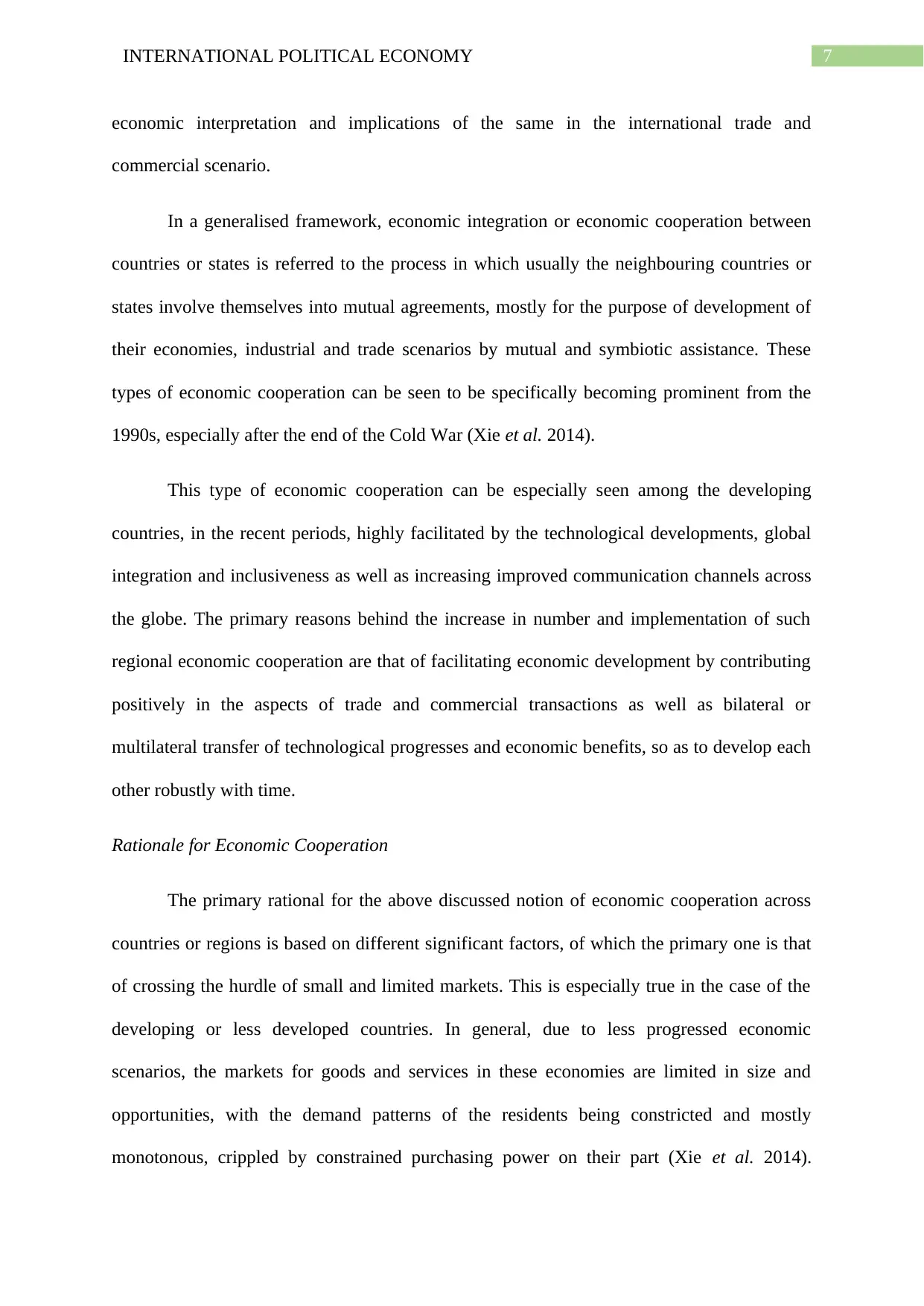
7INTERNATIONAL POLITICAL ECONOMY
economic interpretation and implications of the same in the international trade and
commercial scenario.
In a generalised framework, economic integration or economic cooperation between
countries or states is referred to the process in which usually the neighbouring countries or
states involve themselves into mutual agreements, mostly for the purpose of development of
their economies, industrial and trade scenarios by mutual and symbiotic assistance. These
types of economic cooperation can be seen to be specifically becoming prominent from the
1990s, especially after the end of the Cold War (Xie et al. 2014).
This type of economic cooperation can be especially seen among the developing
countries, in the recent periods, highly facilitated by the technological developments, global
integration and inclusiveness as well as increasing improved communication channels across
the globe. The primary reasons behind the increase in number and implementation of such
regional economic cooperation are that of facilitating economic development by contributing
positively in the aspects of trade and commercial transactions as well as bilateral or
multilateral transfer of technological progresses and economic benefits, so as to develop each
other robustly with time.
Rationale for Economic Cooperation
The primary rational for the above discussed notion of economic cooperation across
countries or regions is based on different significant factors, of which the primary one is that
of crossing the hurdle of small and limited markets. This is especially true in the case of the
developing or less developed countries. In general, due to less progressed economic
scenarios, the markets for goods and services in these economies are limited in size and
opportunities, with the demand patterns of the residents being constricted and mostly
monotonous, crippled by constrained purchasing power on their part (Xie et al. 2014).
economic interpretation and implications of the same in the international trade and
commercial scenario.
In a generalised framework, economic integration or economic cooperation between
countries or states is referred to the process in which usually the neighbouring countries or
states involve themselves into mutual agreements, mostly for the purpose of development of
their economies, industrial and trade scenarios by mutual and symbiotic assistance. These
types of economic cooperation can be seen to be specifically becoming prominent from the
1990s, especially after the end of the Cold War (Xie et al. 2014).
This type of economic cooperation can be especially seen among the developing
countries, in the recent periods, highly facilitated by the technological developments, global
integration and inclusiveness as well as increasing improved communication channels across
the globe. The primary reasons behind the increase in number and implementation of such
regional economic cooperation are that of facilitating economic development by contributing
positively in the aspects of trade and commercial transactions as well as bilateral or
multilateral transfer of technological progresses and economic benefits, so as to develop each
other robustly with time.
Rationale for Economic Cooperation
The primary rational for the above discussed notion of economic cooperation across
countries or regions is based on different significant factors, of which the primary one is that
of crossing the hurdle of small and limited markets. This is especially true in the case of the
developing or less developed countries. In general, due to less progressed economic
scenarios, the markets for goods and services in these economies are limited in size and
opportunities, with the demand patterns of the residents being constricted and mostly
monotonous, crippled by constrained purchasing power on their part (Xie et al. 2014).
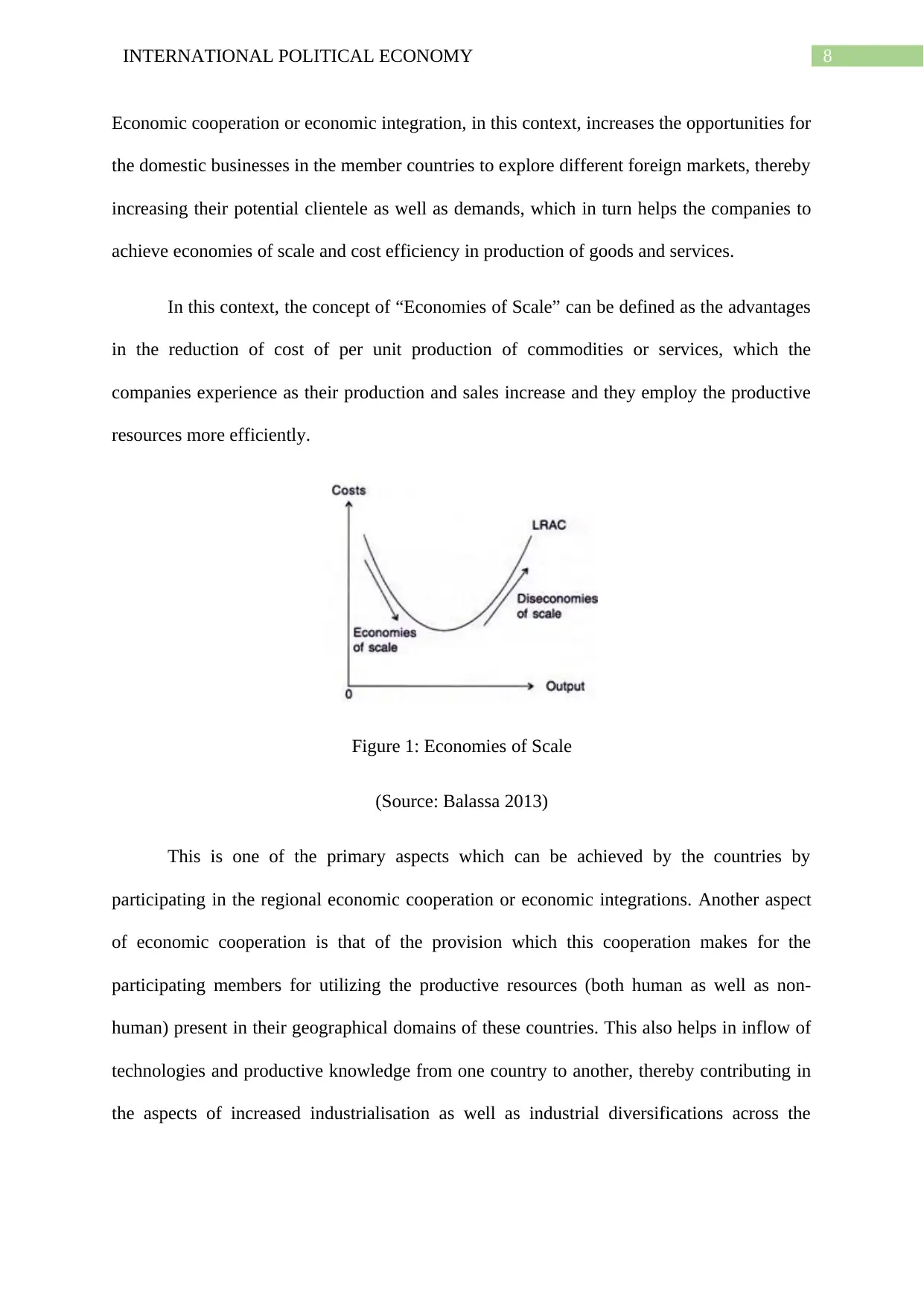
8INTERNATIONAL POLITICAL ECONOMY
Economic cooperation or economic integration, in this context, increases the opportunities for
the domestic businesses in the member countries to explore different foreign markets, thereby
increasing their potential clientele as well as demands, which in turn helps the companies to
achieve economies of scale and cost efficiency in production of goods and services.
In this context, the concept of “Economies of Scale” can be defined as the advantages
in the reduction of cost of per unit production of commodities or services, which the
companies experience as their production and sales increase and they employ the productive
resources more efficiently.
Figure 1: Economies of Scale
(Source: Balassa 2013)
This is one of the primary aspects which can be achieved by the countries by
participating in the regional economic cooperation or economic integrations. Another aspect
of economic cooperation is that of the provision which this cooperation makes for the
participating members for utilizing the productive resources (both human as well as non-
human) present in their geographical domains of these countries. This also helps in inflow of
technologies and productive knowledge from one country to another, thereby contributing in
the aspects of increased industrialisation as well as industrial diversifications across the
Economic cooperation or economic integration, in this context, increases the opportunities for
the domestic businesses in the member countries to explore different foreign markets, thereby
increasing their potential clientele as well as demands, which in turn helps the companies to
achieve economies of scale and cost efficiency in production of goods and services.
In this context, the concept of “Economies of Scale” can be defined as the advantages
in the reduction of cost of per unit production of commodities or services, which the
companies experience as their production and sales increase and they employ the productive
resources more efficiently.
Figure 1: Economies of Scale
(Source: Balassa 2013)
This is one of the primary aspects which can be achieved by the countries by
participating in the regional economic cooperation or economic integrations. Another aspect
of economic cooperation is that of the provision which this cooperation makes for the
participating members for utilizing the productive resources (both human as well as non-
human) present in their geographical domains of these countries. This also helps in inflow of
technologies and productive knowledge from one country to another, thereby contributing in
the aspects of increased industrialisation as well as industrial diversifications across the
⊘ This is a preview!⊘
Do you want full access?
Subscribe today to unlock all pages.

Trusted by 1+ million students worldwide
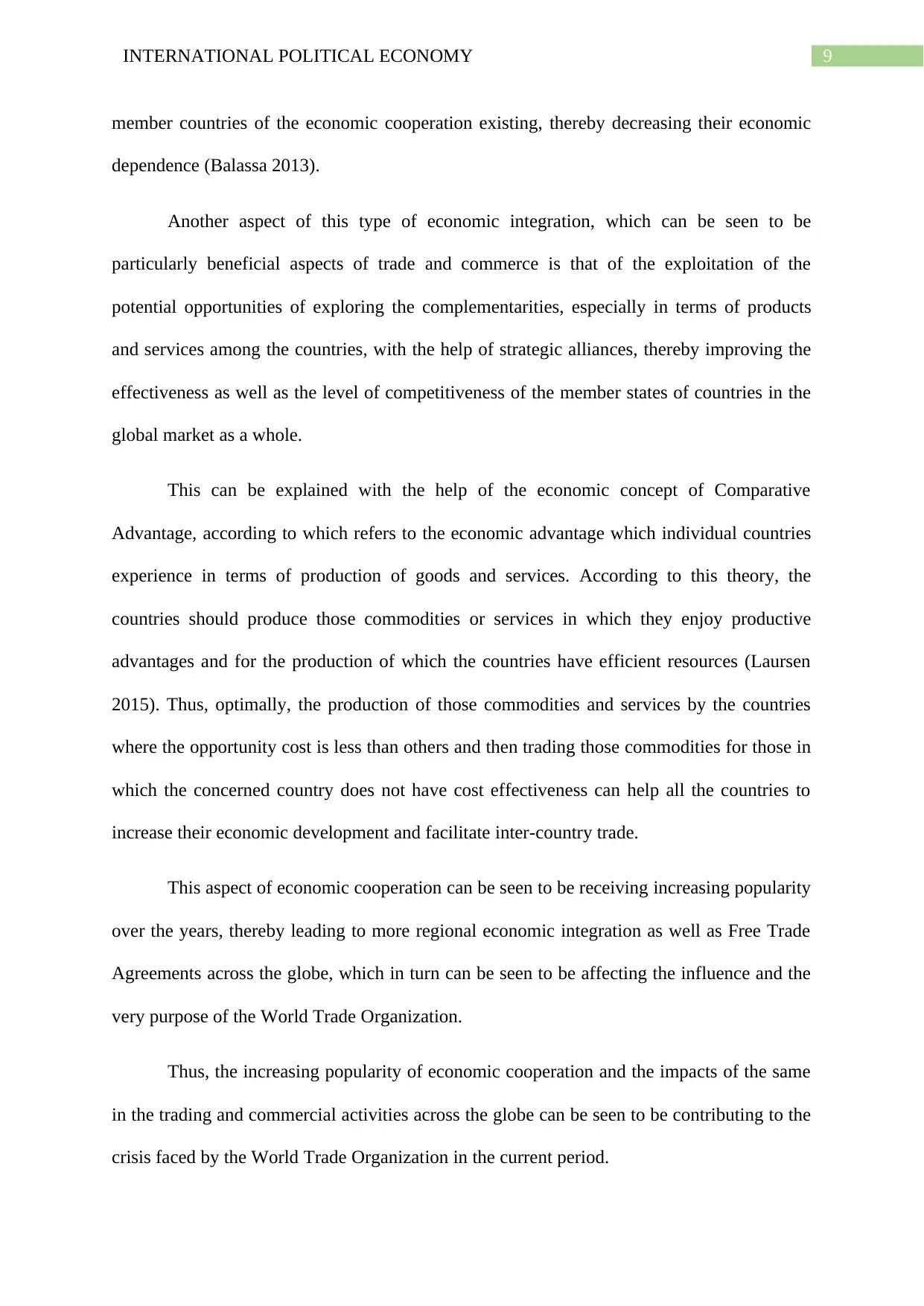
9INTERNATIONAL POLITICAL ECONOMY
member countries of the economic cooperation existing, thereby decreasing their economic
dependence (Balassa 2013).
Another aspect of this type of economic integration, which can be seen to be
particularly beneficial aspects of trade and commerce is that of the exploitation of the
potential opportunities of exploring the complementarities, especially in terms of products
and services among the countries, with the help of strategic alliances, thereby improving the
effectiveness as well as the level of competitiveness of the member states of countries in the
global market as a whole.
This can be explained with the help of the economic concept of Comparative
Advantage, according to which refers to the economic advantage which individual countries
experience in terms of production of goods and services. According to this theory, the
countries should produce those commodities or services in which they enjoy productive
advantages and for the production of which the countries have efficient resources (Laursen
2015). Thus, optimally, the production of those commodities and services by the countries
where the opportunity cost is less than others and then trading those commodities for those in
which the concerned country does not have cost effectiveness can help all the countries to
increase their economic development and facilitate inter-country trade.
This aspect of economic cooperation can be seen to be receiving increasing popularity
over the years, thereby leading to more regional economic integration as well as Free Trade
Agreements across the globe, which in turn can be seen to be affecting the influence and the
very purpose of the World Trade Organization.
Thus, the increasing popularity of economic cooperation and the impacts of the same
in the trading and commercial activities across the globe can be seen to be contributing to the
crisis faced by the World Trade Organization in the current period.
member countries of the economic cooperation existing, thereby decreasing their economic
dependence (Balassa 2013).
Another aspect of this type of economic integration, which can be seen to be
particularly beneficial aspects of trade and commerce is that of the exploitation of the
potential opportunities of exploring the complementarities, especially in terms of products
and services among the countries, with the help of strategic alliances, thereby improving the
effectiveness as well as the level of competitiveness of the member states of countries in the
global market as a whole.
This can be explained with the help of the economic concept of Comparative
Advantage, according to which refers to the economic advantage which individual countries
experience in terms of production of goods and services. According to this theory, the
countries should produce those commodities or services in which they enjoy productive
advantages and for the production of which the countries have efficient resources (Laursen
2015). Thus, optimally, the production of those commodities and services by the countries
where the opportunity cost is less than others and then trading those commodities for those in
which the concerned country does not have cost effectiveness can help all the countries to
increase their economic development and facilitate inter-country trade.
This aspect of economic cooperation can be seen to be receiving increasing popularity
over the years, thereby leading to more regional economic integration as well as Free Trade
Agreements across the globe, which in turn can be seen to be affecting the influence and the
very purpose of the World Trade Organization.
Thus, the increasing popularity of economic cooperation and the impacts of the same
in the trading and commercial activities across the globe can be seen to be contributing to the
crisis faced by the World Trade Organization in the current period.
Paraphrase This Document
Need a fresh take? Get an instant paraphrase of this document with our AI Paraphraser
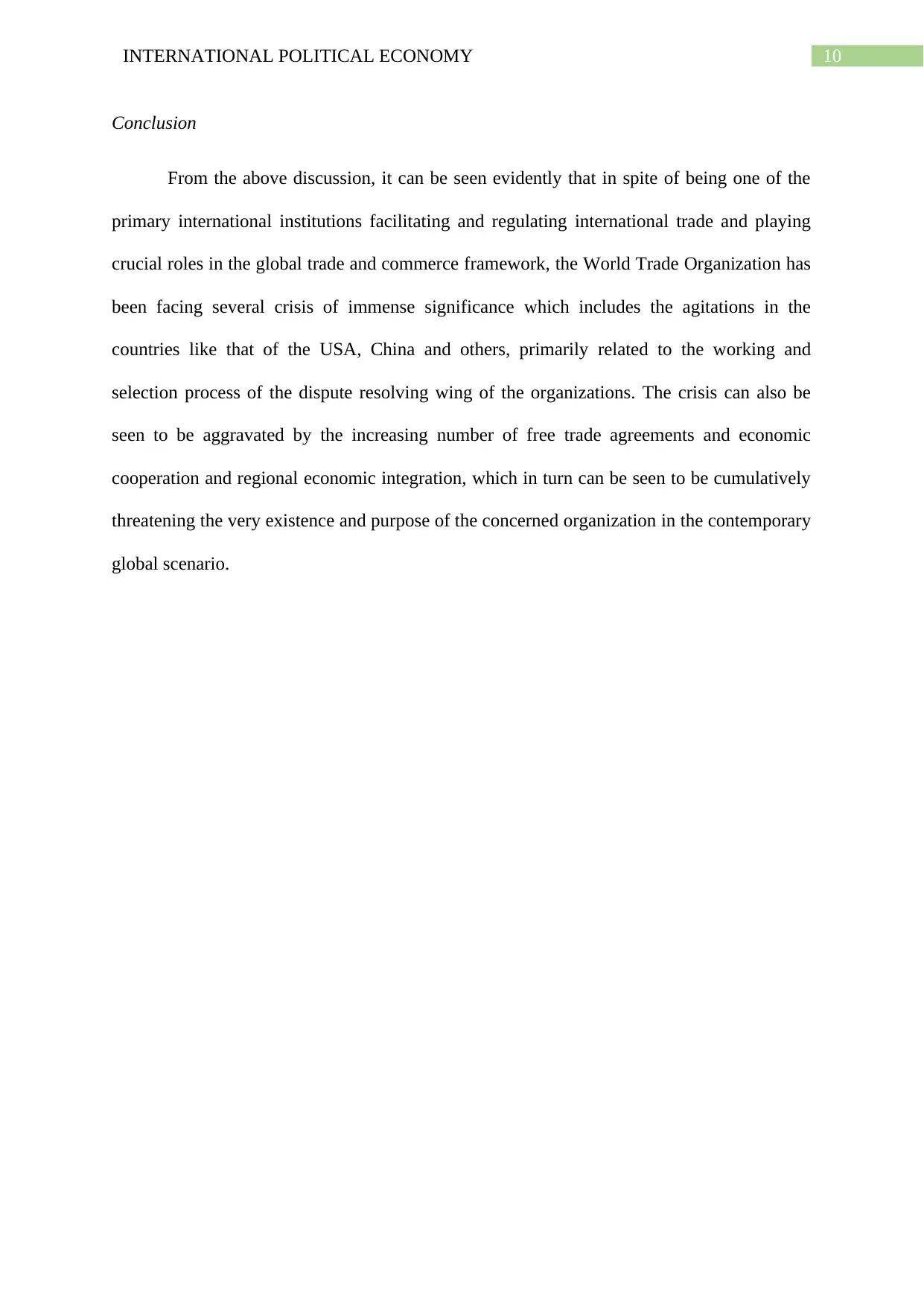
10INTERNATIONAL POLITICAL ECONOMY
Conclusion
From the above discussion, it can be seen evidently that in spite of being one of the
primary international institutions facilitating and regulating international trade and playing
crucial roles in the global trade and commerce framework, the World Trade Organization has
been facing several crisis of immense significance which includes the agitations in the
countries like that of the USA, China and others, primarily related to the working and
selection process of the dispute resolving wing of the organizations. The crisis can also be
seen to be aggravated by the increasing number of free trade agreements and economic
cooperation and regional economic integration, which in turn can be seen to be cumulatively
threatening the very existence and purpose of the concerned organization in the contemporary
global scenario.
Conclusion
From the above discussion, it can be seen evidently that in spite of being one of the
primary international institutions facilitating and regulating international trade and playing
crucial roles in the global trade and commerce framework, the World Trade Organization has
been facing several crisis of immense significance which includes the agitations in the
countries like that of the USA, China and others, primarily related to the working and
selection process of the dispute resolving wing of the organizations. The crisis can also be
seen to be aggravated by the increasing number of free trade agreements and economic
cooperation and regional economic integration, which in turn can be seen to be cumulatively
threatening the very existence and purpose of the concerned organization in the contemporary
global scenario.
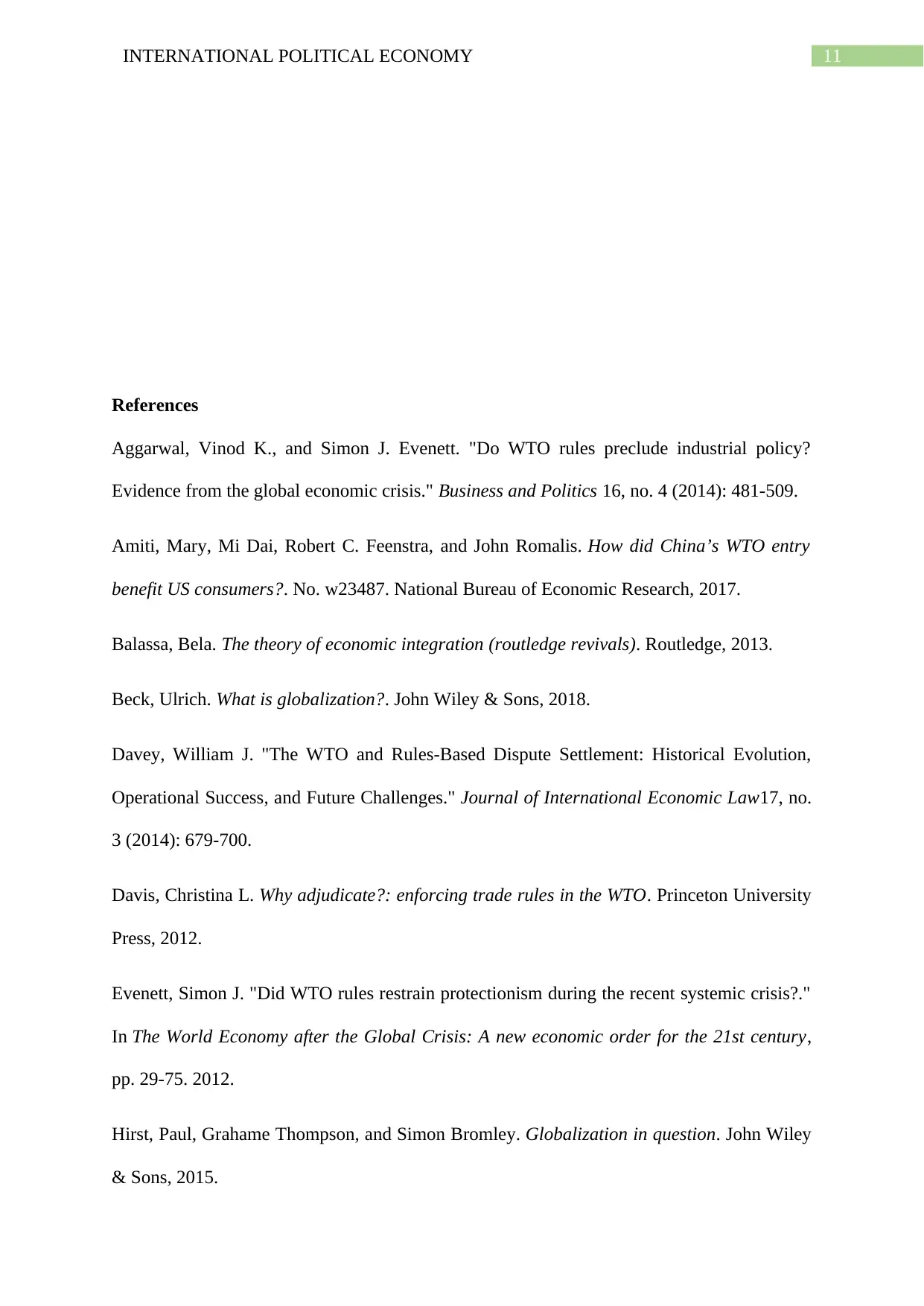
11INTERNATIONAL POLITICAL ECONOMY
References
Aggarwal, Vinod K., and Simon J. Evenett. "Do WTO rules preclude industrial policy?
Evidence from the global economic crisis." Business and Politics 16, no. 4 (2014): 481-509.
Amiti, Mary, Mi Dai, Robert C. Feenstra, and John Romalis. How did China’s WTO entry
benefit US consumers?. No. w23487. National Bureau of Economic Research, 2017.
Balassa, Bela. The theory of economic integration (routledge revivals). Routledge, 2013.
Beck, Ulrich. What is globalization?. John Wiley & Sons, 2018.
Davey, William J. "The WTO and Rules-Based Dispute Settlement: Historical Evolution,
Operational Success, and Future Challenges." Journal of International Economic Law17, no.
3 (2014): 679-700.
Davis, Christina L. Why adjudicate?: enforcing trade rules in the WTO. Princeton University
Press, 2012.
Evenett, Simon J. "Did WTO rules restrain protectionism during the recent systemic crisis?."
In The World Economy after the Global Crisis: A new economic order for the 21st century,
pp. 29-75. 2012.
Hirst, Paul, Grahame Thompson, and Simon Bromley. Globalization in question. John Wiley
& Sons, 2015.
References
Aggarwal, Vinod K., and Simon J. Evenett. "Do WTO rules preclude industrial policy?
Evidence from the global economic crisis." Business and Politics 16, no. 4 (2014): 481-509.
Amiti, Mary, Mi Dai, Robert C. Feenstra, and John Romalis. How did China’s WTO entry
benefit US consumers?. No. w23487. National Bureau of Economic Research, 2017.
Balassa, Bela. The theory of economic integration (routledge revivals). Routledge, 2013.
Beck, Ulrich. What is globalization?. John Wiley & Sons, 2018.
Davey, William J. "The WTO and Rules-Based Dispute Settlement: Historical Evolution,
Operational Success, and Future Challenges." Journal of International Economic Law17, no.
3 (2014): 679-700.
Davis, Christina L. Why adjudicate?: enforcing trade rules in the WTO. Princeton University
Press, 2012.
Evenett, Simon J. "Did WTO rules restrain protectionism during the recent systemic crisis?."
In The World Economy after the Global Crisis: A new economic order for the 21st century,
pp. 29-75. 2012.
Hirst, Paul, Grahame Thompson, and Simon Bromley. Globalization in question. John Wiley
& Sons, 2015.
⊘ This is a preview!⊘
Do you want full access?
Subscribe today to unlock all pages.

Trusted by 1+ million students worldwide
1 out of 14
Related Documents
Your All-in-One AI-Powered Toolkit for Academic Success.
+13062052269
info@desklib.com
Available 24*7 on WhatsApp / Email
![[object Object]](/_next/static/media/star-bottom.7253800d.svg)
Unlock your academic potential
Copyright © 2020–2026 A2Z Services. All Rights Reserved. Developed and managed by ZUCOL.





